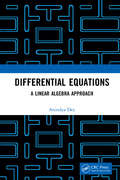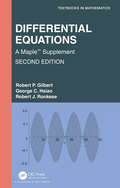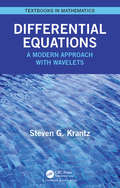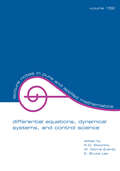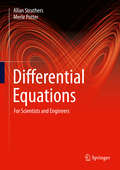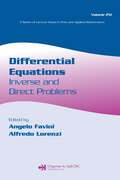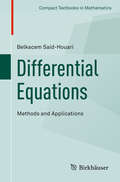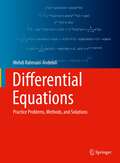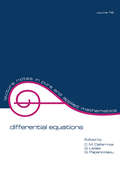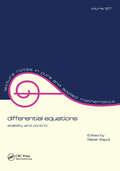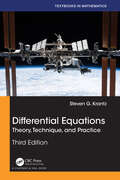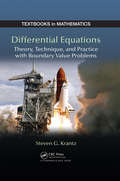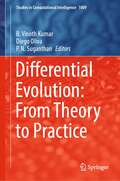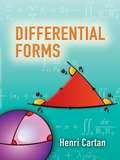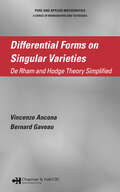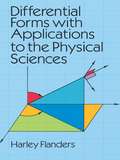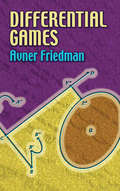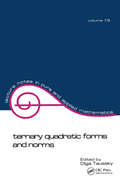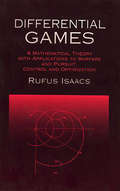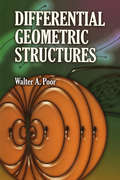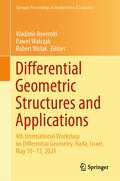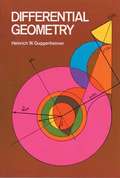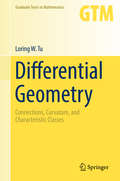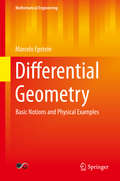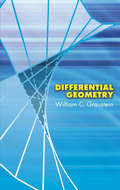- Table View
- List View
Differential Equations: A Linear Algebra Approach
by Anindya DeyDifferential Equations: A Linear Algebra Approach follows an innovative approach of inculcating linear algebra and elementary functional analysis in the backdrop of even the simple methods of solving ordinary differential equations. The contents of the book have been made user-friendly through concise useful theoretical discussions and numerous illustrative examples practical and pathological.
Differential Equations: A Maple™ Supplement (Textbooks in Mathematics)
by Robert P. Gilbert George C. Hsiao Robert J. RonkeseThis book illustrates how MAPLE can be used to supplement a standard, elementary text in ordinary and partial differential equation. MAPLE is used with several purposes in mind. The authors are firm believers in the teaching of mathematics as an experimental science where the student does numerous calculations and then synthesizes these experiments into a general theory. Projects based on the concept of writing generic programs test a student's understanding of the theoretical material of the course. A student who can solve a general problem certainly can solve a specialized problem. The authors show MAPLE has a built-in program for doing these problems. While it is important for the student to learn MAPLEŚ in built programs, using these alone removes the student from the conceptual nature of differential equations. The goal of the book is to teach the students enough about the computer algebra system MAPLE so that it can be used in an investigative way. The investigative materials which are present in the book are done in desk calculator mode DCM, that is the calculations are in the order command line followed by output line. Frequently, this approach eventually leads to a program or procedure in MAPLE designated by proc and completed by end proc. This book was developed through ten years of instruction in the differential equations course. Table of Contents 1. Introduction to the Maple DEtools 2. First-order Differential Equations 3. Numerical Methods for First Order Equations 4. The Theory of Second Order Differential Equations with Con- 5. Applications of Second Order Linear Equations 6. Two-Point Boundary Value Problems, Catalytic Reactors and 7. Eigenvalue Problems 8. Power Series Methods for Solving Differential Equations 9. Nonlinear Autonomous Systems 10. Integral Transforms Biographies Robert P. Gilbert holds a Ph.D. in mathematics from Carnegie Mellon University. He and Jerry Hile originated the method of generalized hyperanalytic function theory. Dr. Gilbert was professor at Indiana University, Bloomington and later became the Unidel Foundation Chair of Mathematics at the University of Delaware. He has published over 300 articles in professional journals and conference proceedings. He is the Founding Editor of two mathematics journals Complex Variables and Applicable Analysis. He is a three-time Awardee of the Humboldt-Preis, and. received a British Research Council award to do research at Oxford University. He is also the recipient of a Doctor Honoris Causa from the I. Vekua Institute of Applied Mathematics at Tbilisi State University. George C. Hsiao holds a doctorate degree in Mathematics from Carnegie Mellon University. Dr. Hsiao is the Carl J. Rees Professor of Mathematics Emeritus at the University of Delaware from which he retired after 43 years on the faculty of the Department of Mathematical Sciences. Dr. Hsiao was also the recipient of the Francis Alison Faculty Award, the University of Delaware’s most prestigious faculty honor, which was bestowed on him in recognition of his scholarship, professional achievement and dedication. His primary research interests are integral equations and partial differential equations with their applications in mathematical physics and continuum mechanics. He is the author or co-author of more than 200 publications in books and journals. Dr. Hsiao is world-renowned for his expertise in Boundary Element Method and has given invited lectures all over the world. Robert J. Ronkese holds a PhD in applied mathematics from the University of Delaware. He is a professor of mathematics at the US Merchant Marine Academy on Long Island. As an undergraduate, he was an exchange student at the Swiss Federal Institute of Technology (ETH) in Zurich. He has held visiting positions at the US Military Aca
Differential Equations: A Modern Approach with Wavelets (Textbooks in Mathematics)
by Steven KrantzThis new book from one of the most published authors in all of mathematics is an attempt to offer a new, more modern take on the Differential Equations course. The world is changing. Because of the theory of wavelets, Fourier analysis is ever more important and central. And applications are a driving force behind much of mathematics.This text text presents a more balanced picture. The text covers differential equations (both ordinary and partial), Fourier analysis and applications in equal measure and with equal weight. The Riemann integral is used throughout. We do not assume that the student knows any functional analysis. We likewise do not assume that the student has had a course in undergraduate real analysis. To make the book timely and exciting, a substantial chapter on basic properties of wavelets, with applications to signal processing and image processing is included. This should give students and instructors alike a taste of what is happening in the subject today.
Differential Equations: Dynamical Systems, and Control Science: Lecture Notes in Pure and Applied Mathematics Series/152 (Lecture Notes In Pure And Applied Mathematics Ser. #152)
by K. D Elworthy W. Norrie Everitt E. Bruce LeePresents recent developments in the areas of differential equations, dynamical systems, and control of finke and infinite dimensional systems. Focuses on current trends in differential equations and dynamical system research-from Darameterdependence of solutions to robui control laws for inflnite dimensional systems.
Differential Equations: For Scientists and Engineers
by Allan Struthers Merle PotterThis book is designed to serve as a textbook for a course on ordinary differential equations, which is usually a required course in most science and engineering disciplines and follows calculus courses. The book begins with linear algebra, including a number of physical applications, and goes on to discuss first-order differential equations, linear systems of differential equations, higher order differential equations, Laplace transforms, nonlinear systems of differential equations, and numerical methods used in solving differential equations. The style of presentation of the book ensures that the student with a minimum of assistance may apply the theorems and proofs presented. Liberal use of examples and homework problems aids the student in the study of the topics presented and applying them to numerous applications in the real scientific world. This textbook focuses on the actual solution of ordinary differential equations preparing the student to solve ordinary differential equations when exposed to such equations in subsequent courses in engineering or pure science programs. The book can be used as a text in a one-semester core course on differential equations, alternatively it can also be used as a partial or supplementary text in intensive courses that cover multiple topics including differential equations.
Differential Equations: Inverse and Direct Problems (Lecture Notes in Pure and Applied Mathematics)
by Angelo Favini Alfiredo LorenziWith contributions from some of the leading authorities in the field, the work in Differential Equations: Inverse and Direct Problems stimulates the preparation of new research results and offers exciting possibilities not only in the future of mathematics but also in physics, engineering, superconductivity in special materials, and other scientifi
Differential Equations: Methods and Applications
by Belkacem Said-HouariThis book presents a variety of techniques for solving ordinary differential equations analytically and features a wealth of examples. Focusing on the modeling of real-world phenomena, it begins with a basic introduction to differential equations, followed by linear and nonlinear first order equations and a detailed treatment of the second order linear equations. After presenting solution methods for the Laplace transform and power series, it lastly presents systems of equations and offers an introduction to the stability theory. To help readers practice the theory covered, two types of exercises are provided: those that illustrate the general theory, and others designed to expand on the text material. Detailed solutions to all the exercises are included. The book is excellently suited for use as a textbook for an undergraduate class (of all disciplines) in ordinary differential equations.
Differential Equations: Practice Problems, Methods, and Solutions
by Mehdi Rahmani-AndebiliThis study guide is designed for students taking courses in differential equations. The textbook includes examples, questions, and exercises that will help engineering students to review and sharpen their knowledge of the subject and enhance their performance in the classroom. Offering detailed solutions, multiple methods for solving problems, and clear explanations of concepts, this hands-on guide will improve student’s problem-solving skills and basic and advanced understanding of the topics covered in electric circuit analysis courses.
Differential Equations: Proceedings of the 1987 Equadiff Conference
by C. M. DafermosThis volume is an outcome of the EQUADIFF 87 conference in Greece. It addresses a wide spectrum of topics in the theory and applications of differential equations, ordinary, partial, and functional. The book is intended for mathematics and scientists.
Differential Equations: Stability and Control (Lecture Notes in Pure and Applied Mathematics)
by Saber ElaydiReports and expands upon topics discussed at the International Conference on [title] held in Colorado Springs, Colo., June 1989. Presents recent advances in control, oscillation, and stability theories, spanning a variety of subfields and covering evolution equations, and differential inclusions.
Differential Equations: Theory, Technique, and Practice (Textbooks in Mathematics)
by Steven G. KrantzDifferential equations is one of the oldest subjects in modern mathematics. It was not long after Newton and Leibniz invented the calculus that Bernoulli and Euler and others began to consider the heat equation and the wave equation of mathematical physics. Newton himself solved differential equations both in the study of planetary motion and also in his consideration of optics. Today differential equations is the centerpiece of much of engineering, of physics, of significant parts of the life sciences, and in many areas of mathematical modeling. This text describes classical ideas and provides an entree to the newer ones. The author pays careful attention to advanced topics like the Laplace transform, Sturm–Liouville theory, and boundary value problems (on the traditional side) but also pays due homage to nonlinear theory, to modeling, and to computing (on the modern side). This book began as a modernization of George Simmons’ classic, Differential Equations with Applications and Historical Notes. Prof. Simmons invited the author to update his book. Now in the third edition, this text has become the author’s own and a unique blend of the traditional and the modern. The text describes classical ideas and provides an entree to newer ones. Modeling brings the subject to life and makes the ideas real. Differential equations can model real life questions, and computer calculations and graphics can then provide real life answers. The symbiosis of the synthetic and the calculational provides a rich experience for students, and prepares them for more concrete, applied work in future courses. Additional Features Anatomy of an Application sections. Historical notes continue to be a unique feature of this text. Math Nuggets are brief perspectives on mathematical lives or other features of the discipline that will enhance the reading experience. Problems for Review and Discovery give students some open-ended material for exploration and further learning. They are an important means of extending the reach of the text, and for anticipating future work. This new edition is re-organized to make it more useful and more accessible. The most frequently taught topics are now up front. And the major applications are isolated in their own chapters. This makes this edition the most useable and flexible of any previous editions.
Differential Equations: Theory,Technique and Practice with Boundary Value Problems (Textbooks In Mathematics Ser. #30)
by Steven G. KrantzDifferential Equations: Theory, Technique, and Practice with Boundary Value Problems presents classical ideas and cutting-edge techniques for a contemporary, undergraduate-level, one- or two-semester course on ordinary differential equations. Authored by a widely respected researcher and teacher, the text covers standard topics such as partial diff
Differential Evolution: From Theory to Practice (Studies in Computational Intelligence #1009)
by Diego Oliva B. Vinoth Kumar P. N. SuganthanThis book addresses and disseminates state-of-the-art research and development of differential evolution (DE) and its recent advances, such as the development of adaptive, self-adaptive and hybrid techniques. Differential evolution is a population-based meta-heuristic technique for global optimization capable of handling non-differentiable, non-linear and multi-modal objective functions. Many advances have been made recently in differential evolution, from theory to applications. This book comprises contributions which include theoretical developments in DE, performance comparisons of DE, hybrid DE approaches, parallel and distributed DE for multi-objective optimization, software implementations, and real-world applications. The book is useful for researchers, practitioners, and students in disciplines such as optimization, heuristics, operations research and natural computing.
Differential Forms (Dover Books on Mathematics)
by Henri Cartan"Cartan's work provides a superb text for an undergraduate course in advanced calculus, but at the same time it furnishes the reader with an excellent foundation for global and nonlinear algebra."--Mathematical Review"Brilliantly successful."--Bulletin de l'Association des Professeurs de Mathematiques"The presentation is precise and detailed, the style lucid and almost conversational . . . clearly an outstanding text and work of reference."--AnnalesCartan's Formes Differentielles was first published in France in 1967. It was based on the world-famous teacher's experience at the Faculty of Sciences in Paris, where his reputation as an outstanding exponent of the Bourbaki school of mathematics was first established.Addressed to second- and third-year students of mathematics, the material skillfully spans the pure and applied branches in the familiar French manner, so that the applied aspects gain in rigor while the pure mathematics loses none of its dignity. This book is equally essential as a course text, as a work of reference, or simply as a brilliant mathematical exercise.
Differential Forms on Singular Varieties: De Rham and Hodge Theory Simplified (Chapman & Hall/CRC Pure and Applied Mathematics)
by Vincenzo Ancona Bernard GaveauDifferential Forms on Singular Varieties: De Rham and Hodge Theory Simplified uses complexes of differential forms to give a complete treatment of the Deligne theory of mixed Hodge structures on the cohomology of singular spaces. This book features an approach that employs recursive arguments on dimension and does not introduce spaces of hig
Differential Forms with Applications to the Physical Sciences (Dover Books on Mathematics)
by Harley Flanders"To the reader who wishes to obtain a bird's-eye view of the theory of differential forms with applications to other branches of pure mathematics, applied mathematic and physics, I can recommend no better book." -- T. J. Willmore, London Mathematical Society Journal.This excellent text introduces the use of exterior differential forms as a powerful tool in the analysis of a variety of mathematical problems in the physical and engineering sciences. Requiring familiarity with several variable calculus and some knowledge of linear algebra and set theory, it is directed primarily to engineers and physical scientists, but it has also been used successfully to introduce modern differential geometry to students in mathematics.Chapter I introduces exterior differential forms and their comparisons with tensors. The next three chapters take up exterior algebra, the exterior derivative and their applications. Chapter V discusses manifolds and integration, and Chapter VI covers applications in Euclidean space. The last three chapters explore applications to differential equations, differential geometry, and group theory."The book is very readable, indeed, enjoyable -- and, although addressed to engineers and scientists, should be not at all inaccessible to or inappropriate for ... first year graduate students and bright undergraduates." -- F. E. J. Linton, Wesleyan University, American Mathematical Monthly.
Differential Games
by Prof. Avner FriedmanThis volume lays the mathematical foundations for the theory of differential games, developing a rigorous mathematical framework with existence theorems. It begins with a precise definition of a differential game and advances to considerations of games of fixed duration, games of pursuit and evasion, the computation of saddle points, games of survival, and games with restricted phase coordinates. Final chapters cover selected topics (including capturability and games with delayed information) and N-person games.Geared toward graduate students, Differential Games will be of particular interest to professionals in the fields of electrical engineering, industrial engineering, economics, and mathematics. Although intended primarily for self-study, it can be used as a core or ancillary text in courses in differential games, game theory, and control theory.
Differential Games and Control Theory Iii: Proceedings of the Third Kingston Conference (Lecture Notes In Pure And Applied Mathematics Ser. #44)
by Pan-Tai LiuThis book is based on the Third Kingston Conference on Differential Games and Control Theory held at the University of Rhode Island June 5-8, 1978. It deals with deterministic systems and stochastic systems, and is helpful for the researchers in applied mathematics.
Differential Games: A Mathematical Theory with Applications to Warfare and Pursuit, Control and Optimization
by Rufus IsaacsOne of the definitive works in game theory, this fascinating volume offers an original look at methods of obtaining solutions for conflict situations. Combining the principles of game theory, the calculus of variations, and control theory, the author considers and solves an amazing array of problems: military, pursuit and evasion, games of firing and maneuver, athletic contests, and many other problems of conflict.Beginning with general definitions and the basic mathematics behind differential game theory, the author proceeds to examinations of increasingly specific techniques and applications: dispersal, universal, and equivocal surfaces; the role of game theory in warfare; development of an effective theory despite incomplete information; and more. All problems and solutions receive clearly worded, illuminating discussions, including detailed examples and numerous formal calculations.The product of fifteen years of research by a highly experienced mathematician and engineer, this volume will acquaint students of game theory with practical solutions to an extraordinary range of intriguing problems.
Differential Geometric Structures
by Walter A. PoorUseful for independent study and as a reference work, this introduction to differential geometry features many examples and exercises. It defines geometric structure by specifying the parallel transport in an appropriate fiber bundle, focusing on the simplest cases of linear parallel transport in a vector bundle.The treatment opens with an introductory chapter on fiber bundles that proceeds to examinations of connection theory for vector bundles and Riemannian vector bundles. Additional topics include the role of harmonic theory, geometric vector fields on Riemannian manifolds, Lie groups, symmetric spaces, and symplectic and Hermitian vector bundles. A consideration of other differential geometric structures concludes the text, including surveys of characteristic classes of principal bundles, Cartan connections, and spin structures.
Differential Geometric Structures and Applications: 4th International Workshop on Differential Geometry, Haifa, Israel, May 10–13, 2023 (Springer Proceedings in Mathematics & Statistics #440)
by Vladimir Rovenski Paweł Walczak Robert WolakThis proceedings contains a collection of selected, peer-reviewed contributions from the 4th International Workshop "Differential Geometric Structures and Applications" held in Haifa, Israel from May 10–13, 2023. The papers included in this volume showcase the latest advancements in modern geometry and interdisciplinary applications in fields ranging from mathematical physics to biology.Since 2008, this workshop series has provided a platform for researchers in pure and applied mathematics, including students, to engage in discussions and explore the frontiers of modern geometry. Previous workshops in the series have focused on topics such as "Reconstruction of Geometrical Objects Using Symbolic Computations" (2008), "Geometry and Symbolic Computations" (2013), and "Geometric Structures and Interdisciplinary Applications" (2018).
Differential Geometry
by Heinrich W. GuggenheimerThis is a text of local differential geometry considered as an application of advanced calculus and linear algebra. The discussion is designed for advanced undergraduate or beginning graduate study, and presumes of readers only a fair knowledge of matrix algebra and of advanced calculus of functions of several real variables. The author, who is a Professor of Mathematics at the Polytechnic Institute of New York, begins with a discussion of plane geometry and then treats the local theory of Lie groups and transformation groups, solid differential geometry, and Riemannian geometry, leading to a general theory of connections. The author presents a full development of the Erlangen Program in the foundations of geometry as used by Elie Cartan as a basis of modern differential geometry; the book can serve as an introduction to the methods of E. Cartan. The theory is applied to give a complete development of affine differential geometry in two and three dimensions. Although the text deals only with local problems (except for global problems that can be treated by methods of advanced calculus), the definitions have been formulated so as to be applicable to modern global differential geometry. The algebraic development of tensors is equally accessible to physicists and to pure mathematicians. The wealth of specific resutls and the replacement of most tensor calculations by linear algebra makes the book attractive to users of mathematics in other disciplines.
Differential Geometry
by Loring W. TuThis text presents a graduate-level introduction to differential geometry for mathematics and physics students. The exposition follows the historical development of the concepts of connection and curvature with the goal of explaining the Chern-Weil theory of characteristic classes on a principal bundle. Along the way we encounter some of the high points in the history of differential geometry, for example, Gauss' Theorema Egregium and the Gauss-Bonnet theorem. Exercises throughout the book test the reader's understanding of the material and sometimes illustrate extensions of the theory. Initially, the prerequisites for the reader include a passing familiarity with manifolds. After the first chapter, it becomes necessary to understand and manipulate differential forms. A knowledge of de Rham cohomology is required for the last third of the text. Prerequisite material is contained in author's text An Introduction to Manifolds, and can be learned in one semester. For the benefit of the reader and to establish common notations, Appendix A recalls the basics of manifold theory. Additionally, in an attempt to make the exposition more self-contained, sections on algebraic constructions such as the tensor product and the exterior power are included. Differential geometry, as its name implies, is the study of geometry using differential calculus. It dates back to Newton and Leibniz in the seventeenth century, but it was not until the nineteenth century, with the work of Gauss on surfaces and Riemann on the curvature tensor, that differential geometry flourished and its modern foundation was laid. Over the past one hundred years, differential geometry has proven indispensable to an understanding of the physical world, in Einstein's general theory of relativity, in the theory of gravitation, in gauge theory, and now in string theory. Differential geometry is also useful in topology, several complex variables, algebraic geometry, complex manifolds, and dynamical systems, among other fields. The field has even found applications to group theory as in Gromov's work and to probability theory as in Diaconis's work. It is not too far-fetched to argue that differential geometry should be in every mathematician's arsenal.
Differential Geometry
by Marcelo EpsteinDifferential Geometry offers a concise introduction to some basic notions of modern differential geometry and their applications to solid mechanics and physics. Concepts such as manifolds, groups, fibre bundles and groupoids are first introduced within a purely topological framework. They are shown to be relevant to the description of space-time, configuration spaces of mechanical systems, symmetries in general, microstructure and local and distant symmetries of the constitutive response of continuous media. Once these ideas have been grasped at the topological level, the differential structure needed for the description of physical fields is introduced in terms of differentiable manifolds and principal frame bundles. These mathematical concepts are then illustrated with examples from continuum kinematics, Lagrangian and Hamiltonian mechanics, Cauchy fluxes and dislocation theory. This book will be useful for researchers and graduate students in science and engineering.
Differential Geometry
by William C. GrausteinThis first course in differential geometry presents the fundamentals of the metric differential geometry of curves and surfaces in a Euclidean space of three dimensions. Written by an outstanding teacher and mathematician, it explains the material in the most effective way, using vector notation and technique. It also provides an introduction to the study of Riemannian geometry.Suitable for advanced undergraduates and graduate students, the text presupposes a knowledge of calculus. The first nine chapters focus on the theory, treating the basic properties of curves and surfaces, the mapping of surfaces, and the absolute geometry of a surface. The final chapter considers the applications of the theory to certain important classes of surfaces: surfaces of revolution, ruled surfaces, translation surfaces, and minimal surfaces. Nearly 200 problems appear throughout the text, offering ample reinforcement of every subject.
